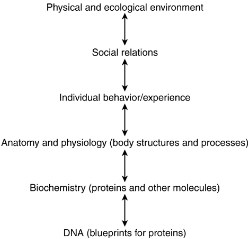There are two sides to this argument: behavior is determined by our genes and behavior is shaped by our environment. While in the past few posts I argue for the environment, or nurture, shaping our personalities, there is also evidence for the nature theory as well. I understand that both sides are valid arguments; however, I see that nurture plays more of an important role in shaping behavior. I will examine arguments for both sides in this post.
(I know this is a lengthy post, but there are subheadings for each topic covered)
History
The nature versus nurture debate can be traced all the way back to 13th century France. Francis Galton used the terms "nature" and "nurture” in 1874 to discuss the influence of genetics and environment on a person's development. Galton states that nature is all that a man brings with himself into the world; nurture is every influence that affects him after his birth.
Personality Development
Psychology has many theories about personality development, but first let’s talk about exactly what personality development is. Personality development is the development of the organized pattern of behaviors and attitudes that makes a person distinctive. Personality development occurs by the ongoing interaction of temperament, character and environment. Temperament is the set of genetic traits that determine a child's approach to the world. There are no genes that specify personality traits, but some genes do control the development of the nervous system, which in turn controls behavior. Looking at this, genes seem to have an indirect role in personality development.
Intelligence
Let’s look at a common topic like intelligence, for example. Asian-Americans, Jews and West Indian Blacks have been unusually successful. An intelligent father and mother will not necessarily give birth to an intelligent child, and an intelligent child can result from not-so-bright parents. Intelligence is quite malleable and owes little or nothing to genetics. Effort plays a major role in intellectual success. Because of culture and parenting, members of these groups work harder and do more with what they have.
There is also a correlation between the verbal ability scores of biological parents and their children compared to adopted children and adoptive parents.

Obesity
What about obesity?. In most cases, genetics determines our size and weight. Now that does not mean that those who are overweight have little hope in changing their lives. With determination and will, one can slightly overcome the genetics and lose weight. Although you may not be the model type, you will be in a healthier weight range. Diet and level of physical activity are important. There are some people who are obese, and yet they have tried everything. 77% of obesity is genetic. Obese children can be doing the exact same activities as the less obese children. It is wrong to stigmatize them and blame their parents without actually knowing anything about their particular diet or exercise. (Just a little side note: I have always wondered what the results would be if I ate as much as I wanted, whenever I wanted. It is easy to gain weight but difficult to lose, in most situations). The obesity example shows that genetics play a role, but the environment can re-shape those influences.
Wild Child
Living in the wild is completely different than living in a nice, comfy home. In the wild, animals hunt for food and live on their own.
A Cambodian girl went missing when she was 8 years old. When found 18 years later, she was hunting for food, walking on all fours and not speaking any intelligible language. This is one of the many cases involving children raised by animals, similar to Romulus and Remus who were raised by wolves. What can we learn from the discovery of the existence of wild children? They would not be able to communicate or show empathy with other human beings. Wild children would typically be entirely unaware of the needs and desires of others. The concepts of morals, property and possessions would be strange to them, and they would be unable to show empathy with others. If brought up by animals, they would not identify themselves as human. The phenomenon of wild children may lead us to conclude that upbringing is entirely responsible for providing humans with language, the ability to think and the concept of our own humanity. What happens in early childhood would have a profound, overriding impact on neurological development. However, the brain does control neurological functioning and genes influence intellectual ability (influence, not form…considering the intelligence paragraph above).
Criminal Behavior
Scientists say that some people are more inclined to commit criminal acts. A study performed by Tehrani and Mednick in 2000 revealed that compared to the control group, the adopted individuals, which were born to incarcerated female offenders, had a higher rate of criminal convictions as adults. The diathesis stress model theorizes that there are individuals born with a propensity for violence for various reasons but may or may not become violent depending upon environmental factors. There is evidence of brain abnormalities contributing to aggression, and serotonin levels are linked to aggression.
The misconception that both genes and environment play a role in the criminality of the individual is not always true. First, what is the environment? Your parents share your genes, so being raised in a violent family cannot be technically considered "environment." It is like genes reacting to genes. What would this be considered as?
Divorce
A study of twins suggests that genetic make-up has a strong influence on whether or not your marriage will last. Marriage and divorce rates were compared in identical and non-identical male twins. Results show that identical twins were more likely to follow the same patterns of divorce than non-identical twins, which suggests a significant genetic influence on divorce.
Freud
Freud said that personality develops by age 5. Childhood is the most important part of personality development. We are born with our id, develop our ego through interaction with the environment and form our superego, or conscience, by age five. Looking at Freud’s theory of personality development, behavior is shaped mostly by the interactions that the child has with the world before age 5. Freud does not mention anything about genetics.
In A Larger View
Your genetically inherited physical and mental capabilities have an impact on how others see you and how you see yourself. If you have poor motor skills and cannot throw a ball straight, then your peers may label you as an incompetent baseball player. Because of your label, you perceive yourself to be a failure. Skin color, gender and sexual orientation are likely to have a major impact on how you perceive yourself as well. Whether you are accepted by others as being normal or abnormal can lead you to think and act in a socially acceptable or deviant way.
Causal Relationships
Everything is related, right? Well, it depends on how you look at it. Nature and nurture exert influences on one another, but they are not necessarily a “cause-effect” relationship. The interactions among hormones, brains and behaviors are incredibly complex.

An example of the influence of human culture on biology is that adolescents are now going through puberty younger than a few generations ago, perhaps as the result of exposure to “grown-up” influences in teenage culture, or possibly because of higher stress.
However, the link between a gene and a behavior is not the same as cause and effect. While a gene may increase the likelihood that you'll behave in a particular way, it does not make people do things. There is still room for choice and free will.
The Other Sides
There are those who argue for nature, and there are those who argue for nurture. In addition, there exists euthenists, who cite bad parenting and the evils of society as the cause of all mental problems, and the proponents of eugenics, who blame faulty genes for all of society's ills and want to prevent all "bad" people from reproducing. These two other sides do not attribute a cause to behavior but attribute a cause to BAD behavior.
A Scale
Imagine a scale with nature on one side and nurture on another. Which side is heavier? Where do you belong? This concept of the scale or spectrum is also seen in politics, with conservative on the right and liberal on the left. Conservatives lean towards nature and liberals towards nurture. Like this spectrum, there are people in the middle, moderates. There are people who argue in favor of nature while others for nurture, but there are exists the ones in the middle, arguing for both. So, now you might wonder why there was even a debate in the first place.
Uncertainty
There is a debate between nature and nurture because of uncertainty. People are not sure, and this creates tension to find out the right answer. If you were given two choices and only two choices (nature or nurture, for example), then you would answer “both” because “both” is not one of the choices.
In A Nutshell
Yes, nature and nurture both play a role in personality development, but what scientists are trying to figure out now is exactly how much each part contributes to behavior.


No comments:
Post a Comment